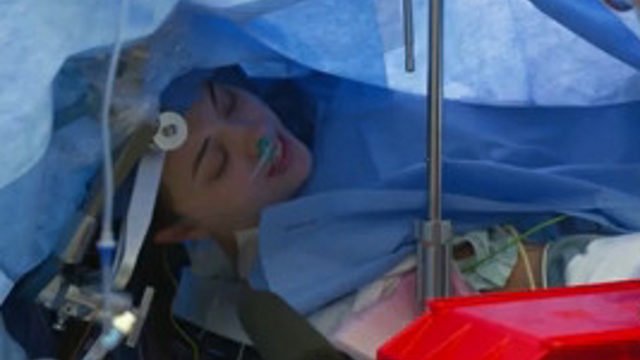Texas woman allowed her brain surgery to be livestreamed on Facebook; She was awake for most of it

DALLAS, Texas -- The thought of having to undergo brain surgery is scary, but imagine having the procedure done while you're still awake ... all while it's being livestreamed on Facebook.
Jenna Schardt, 25, is studying for her masters in occupational therapy at Brenau University in Georgia. One day, Schardt had been helping stroke patients at a rehab hospital as part of her rotations in North Texas when she began to experience symptoms similar to a stroke.
"All of a sudden, during the middle of a conversation, I just couldn't speak any more," Schardt said in a Facebook video posted prior to Tuesday's surgery in Dallas.
Schardt had a mass of blood vessels in the part of her brain that affects her speech. The bleeding from the lesion caused irritation to her brain, which caused her to have seizures despite having no history of them. She was placed on medication, but the seizures were resistant to the medicine and were ineffective.
When doctors found the lesion, Schardt had no choice but to undergo brain surgery if she wanted the seizures to stop.
Schardt agreed to allow Methodist Dallas Medical Center to livestream her awake brain surgery on social media, as she believed it would be educational and could help raise awareness. According to a spokesman for the hospital, the livestream had "several thousand" viewers during the live feed.
Surgeons Dr. Randall Graham and Dr. Bartley Mitchell were tasked with removing the lesion from her brain. By having Schardt awake during surgery, doctors were able to talk to Schardt to physically map out the parts of her brain that control her speech and motor functions.
Schardt was asked to describe pictures and read words off of an iPad while the surgeons worked on mapping out her brain. If she suddenly stopped speaking in the middle of a sentence after a portion of her brain was stimulated, it let the surgeons know that it's an area to avoid.
"It is cool they can do that and that they have this kind of technology," Schardt said in a video the hospital posted before the surgery. "I would rather have them have me awake speaking so we know we're hitting the right areas."
Schardt appeared to be calm throughout the 45-minute surgery, even smiling through large parts of the operation. She even seemed to have a casual conversation with a neuro monitor while the surgeons completed the operation.
"It went absolutely fantastic," Graham said at a press conference following the surgery. "It went very smooth. As expected, no problems came up. She handled it really, really well. When she woke up, she was really interactive and conversive. Her personality actually kept coming through. We're really happy with how things went, and I'm really happy with how she's doing now."
Schardt was taken to the intensive care unit following the operation so they could continue to monitor her to ensure there is no bleeding or seizures. Then, she will be moved to step down status to make sure that she's eating and walking normally, according to Dr. Nimesh Patel, the hospital's chief of neurosurgery.
They expect Schardt to be out of the hospital in three to four days
"She's doing fantastic," Schardt's mom, Wendy, said during the press conference. "She is poised, she is feeling great. She's tired, but she said, 'I don't feel like I had brain surgery.'"
